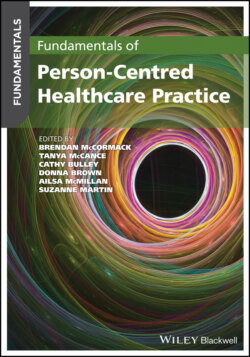Читать книгу Fundamentals of Person-Centred Healthcare Practice - Группа авторов - Страница 54
What is person‐centred practice?
ОглавлениеPerson‐centredness reflects the ideals of humanistic caring in which there is a moral component, and practice has at its basis a therapeutic intent, which is translated through relationships that are built on effective interpersonal processes. Buetow (2016) discusses caring from the perspective of a physician as ‘a moral value and an ethical practice defining a connectedness with, and respectful and concerned attention to, concrete needs of others and oneself’ (p. 104). This philosophical position has resonance across the caring professions and reflects models for developing person‐centred healthcare that fundamentally take account of the humanness of people.
Despite this shared philosophical position, professional groups use a variety of different models and theories to underpin their practice. Within nursing, the use of models has evolved over time, ranging from those based on activities of daily living (Roper et al. 2000) to those that are more relationships centred (Peplau 1997) and many more besides (Fitzpatrick and Whall 2016). The allied health professions have also drawn on a variety of models and theories ranging from the traditional medical model, to biopsychosocial models such as the International Classification of Functioning, Disability and Health (ICF) (WHO 2001) and moving towards the integration of social models for health and well‐being.
Social models of health recognise that our health is influenced by a wide range of individual, interpersonal, organisational, social, environmental, political and economic factors. They encourage us to have a deeper understanding of health: ‘Health, and what makes people healthy, can only be fully understood by exploring the myriad of interactions and influences that emerge out of the complexities of human experience and the various inter‐relationships of the mind, body and society’ (Yuill et al. 2010, p. 14). Irrespective of the models or theories that guide practice (and as reflected in Chapter 2), we advocate the importance of the underpinning values of person‐centredness, where the core value of ‘respect for the person’ is paramount.
Person‐centredness in practice requires the formation of therapeutic relationships among professionals, patients and others significant to them in their lives. It is generally accepted that the principles underpinning person‐centredness as an approach focus on treating people as individuals; respecting their rights as a person; building mutual trust and understanding; and developing positive relationships. Furthermore, these principles reflect a standard of care that practitioners aspire to in their professional practice. The challenge, however, continues to be how these principles are translated into everyday practice to enable multiprofessional teams to deliver this standard of care consistently over time (Mitchell et al. 2015; Wolf et al. 2017; Sharp et al. 2018).
The Person‐centred Practice Framework described in this chapter was originally born out of a desire to operationalise person‐centredness in a way that would illuminate practice, and provide practitioners with a language that would enable them to name components of person‐centredness, and the barriers and enablers that influence its development in the workplace.
